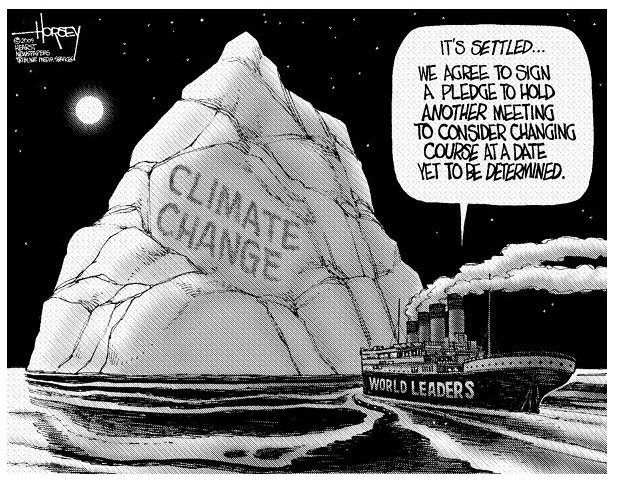Whose job is it to fight climate change?
Adarsha Shivakumar
|January 23, 2010
As I read the events of Copenhagen meetings, several questions came to my mind. When we look at the scale of the climate change problem, we have to ask ourselves: is it too late? Are we even able to make a dent in this monster? If so, isn’t it the governments job to fight it? After much deliberation, I came upon answers. First of all, it isn’t too late yet. Combating climate change is like trying to steer an oil supertanker-a lengthy, difficult, and precise process. While it is certainly daunting, to paraphrase John F. Kennedy, “if the problem is manmade, it is possible that the solutions may also be manmade”. The resources that are needed are immense. In the past, only governments could mobilize these kinds of monies. The issue is that climate change is a global problem on the scale that no single government can afford to fight it. This is where the citizenry’s collective efforts can make the difference. What is needed are mass movements at grassroots levels. We need to educate people and show them that the tools needed to help fight climate change can be simple, accessible, and affordable.
Why do the developed nations have a stake in helping developing nations to combat climate change? Amongst most nations, there has been a general consensus that anthropogenic climate change is real and that we need to act now. However, the consensus breaks down, just as it has at Copenhagen, when it comes to how much responsibility each of the nations has for cleaning up the mess. The developed nations think that irrespective of past CO2 emission history, all nations, rich & poor alike, must share the burden of reducing CO2. When I tried to get a sense of the current understanding in India, it was an eye opener. For the majority of people, climate change is not a priority as there are other issues, such as meeting basic necessities of life. Most of the intelligentsia feels that it is the rich, industrialized nations that created the problem, and they must bear a proportionate burden of the remedial measures. The politicians in developing countries are also subject to as much public pressure and opinions, as are the ones in the developed countries. In developing countries with colonial pasts, submitting to such international conditions is often perceived as neocolonialism. Consequently, these nations are very reluctant to impose emission regulations.
During a time when there are major differences between developed and developing nations as how to mitigate climate change, Project Jatropha aims to demonstrate the commitment of the youth in developed countries to environmental issues that affect the developing nations as well. My sister Apoorva Rangan and I co-founded Project Jatropha in December 2007. In rural South India, many farmers cultivate tobacco as a cash crop. This has forced them to cut down the tree cover and forests for firewood. The processing of raw tobacco leaves in the kilns (barns) itself produces large amount of CO2 and other pollutants. Project Jatropha combats both poverty and environmental degradation using Jatropha curcas, a small perennial shrub with oil-rich seeds. It can grow on marginal lands with fewer agronomic inputs, without diverting valuable land from food grain production. Jatropha biofuel has a ready, large global market, owing to its small carbon footprint. In addition, by providing an alternative crop to tobacco for rural farmers, deforestation and the burning of large quantities of firewood can be reduced.
Project Jatropha is empowering the poorest of the poor farmers with a simple technology and an economic incentive by demonstrating that biofuel can be produced in a sustainable and economic way. In our social experiment, the farmers have become part of the solution to the problem of climate change. A developed nation such as ours will stand to benefit greatly by being an enabler of such types of endeavors even if it means the people helped are nine thousand miles and twelve time zones away. Such actions will demonstrate that the US is able to walk the walk and talk the talk. As Mahatma Gandhi said, “We need to become the change we wish to see in the world.” Project Jatropha has started on a small scale, but I hope it will help to inspire others to start movements of their own.
For more information please visit: www.projectjatropha.com
-Adarsha
Join our Youth Action Network
More Blog Posts

Unnatural, Not Unprecedented
For two weeks, residents of Southern California endured a waking nightmare. Parents raced against time – hurrying down the driveway …
Read MoreCrafting a Vision for the Future: My Experience at LCOY USA 2024
Dry and sunny Tempe, Arizona where temperatures have been over 100 F for 113 consecutive days, delegates gathered to attend …
Read More
7 Ways to Weatherproof Your Home on the Cheap (+1 Not-So-Cheap)
As colder weather sets in, understanding how to weatherproof your home is key to maintaining warmth and reducing energy costs. …
Read More
